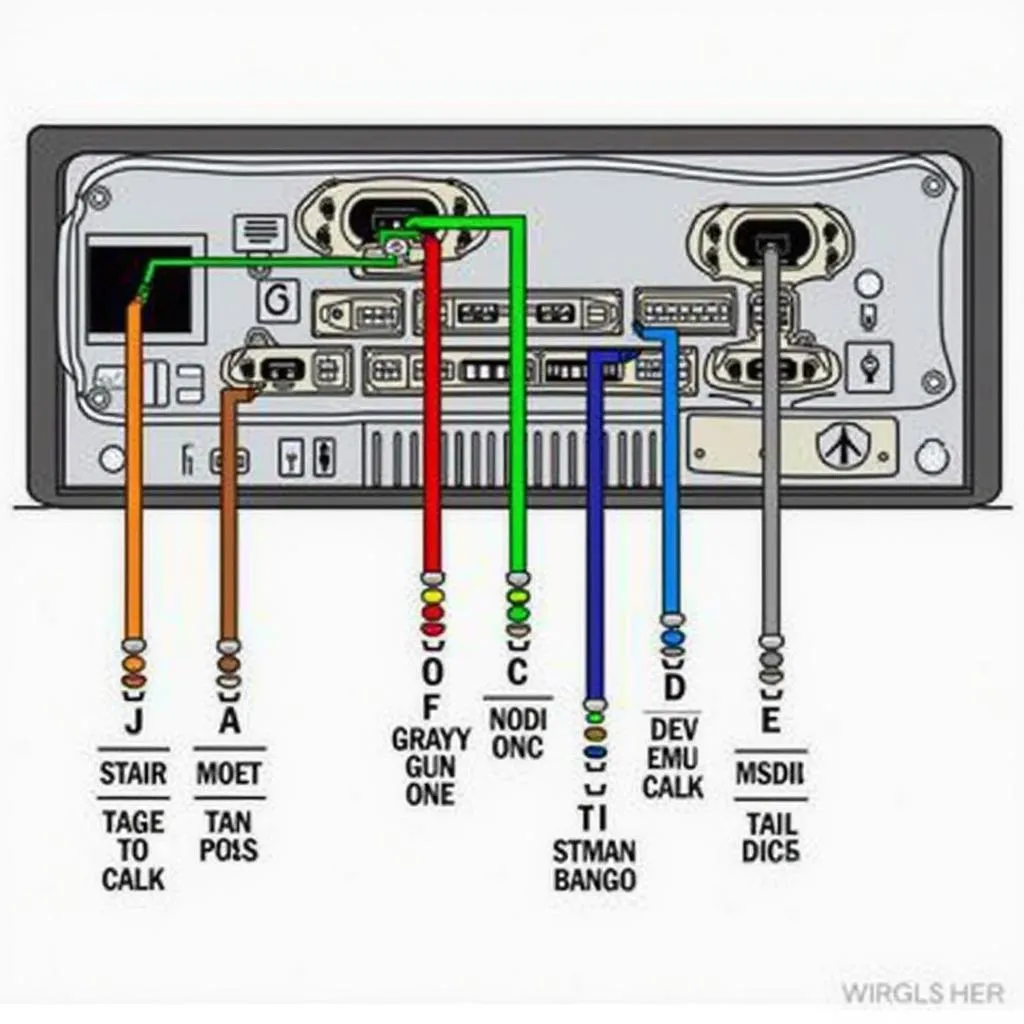The trailer brake warning light is a crucial safety feature on your dashboard. When illuminated, it signals a potential issue with your trailer’s braking system. Ignoring this warning light could lead to dangerous situations, particularly when towing heavy loads. This comprehensive guide delves into the common causes of a trailer brake warning light and provides practical solutions to help you diagnose and address the problem.
Understanding the Trailer Brake Warning Light
The trailer brake warning light, often symbolized by a trailer silhouette with brake shoes or the word “TRAILER,” serves as an indicator of several possible issues within the trailer’s electrical or mechanical braking components. This light is connected to your vehicle’s towing system and is designed to illuminate when it detects a malfunction or inconsistency in the trailer’s brake circuit.
Common Causes of a Trailer Brake Warning Light
A trailer brake warning light can be triggered by a range of issues, spanning from simple electrical glitches to more complex mechanical failures. Recognizing the common culprits can expedite the troubleshooting process.
1. Blown Fuse or Faulty Wiring
One of the most common and straightforward causes is a blown fuse in the trailer brake circuit. A short circuit or power surge can cause the fuse to blow, interrupting the flow of electricity to the trailer brakes. Similarly, damaged or corroded wiring within the trailer wiring harness or the vehicle’s towing connector can disrupt the electrical connection, triggering the warning light.
2. Trailer Brake Controller Malfunction
The trailer brake controller, responsible for regulating the amount of power sent to the trailer brakes, can also be the source of the issue. A faulty brake controller might not be able to effectively transmit the braking signal from your vehicle to the trailer brakes, causing the warning light to illuminate.
3. Trailer Brake Magnet Issues
Trailer brakes often utilize electric brake magnets, which activate the brakes when they receive a signal from the brake controller. Over time, these magnets can wear out, become misaligned, or experience damage, leading to ineffective braking and triggering the warning light.
4. Worn-out Brake Shoes or Drums
Just like your vehicle’s brakes, trailer brakes are subject to wear and tear. Worn-out brake shoes or drums can cause uneven braking or reduced braking force, signaling a problem through the warning light.
5. Breakaway Battery Issues
Trailers equipped with electric brakes often have a breakaway battery that provides power to the brakes if the trailer becomes detached from the tow vehicle. A dead or malfunctioning breakaway battery can trigger the warning light, as it indicates a potential safety hazard.
Troubleshooting the Trailer Brake Warning Light
When the trailer brake warning light illuminates, it’s crucial to address the issue promptly. Here’s a step-by-step guide to help you troubleshoot and potentially resolve the problem:
-
Check the Basics: Begin by inspecting the trailer’s electrical connections. Ensure the trailer is properly hitched to the tow vehicle and that the wiring harness is securely connected. Examine the 7-way connector for any signs of damage, corrosion, or debris. Clean or replace the connector if necessary.
-
Inspect the Fuses: Locate the fuse box in your tow vehicle and identify the fuse associated with the trailer brakes. Consult your vehicle’s owner’s manual for the fuse layout. Check the fuse for any signs of a break or burn mark, indicating a blown fuse. If you find a blown fuse, replace it with a new one of the same amperage.
-
Test the Trailer Brake Controller: If the fuses and connections appear to be in order, proceed to test the trailer brake controller. Consult your brake controller’s manual for specific instructions on testing its functionality. You can generally test the controller by manually applying the trailer brakes using the controller’s lever or dial. Observe if the trailer brakes engage and if the warning light responds accordingly.
-
Inspect the Breakaway System: Check the breakaway battery by pulling out the pin attached to the breakaway cable. This action should engage the trailer brakes. If the brakes fail to activate, the battery might be dead or malfunctioning and needs replacement.
-
Inspect the Brake Magnets: With the trailer safely lifted and supported on jack stands, inspect the brake magnets on each wheel. Look for any signs of physical damage, misalignment, or excessive wear. If you find any issues with the brake magnets, they should be repaired or replaced by a qualified technician.
When to Seek Professional Help
While some trailer brake issues can be resolved with basic troubleshooting, more complex problems often require the expertise of a qualified automotive technician. If you’ve gone through the troubleshooting steps and the warning light persists, it’s strongly recommended to seek professional assistance. Attempting to repair or adjust trailer brake components without proper knowledge and experience can be dangerous and could worsen the problem.
Preventing Trailer Brake Issues
Preventing trailer brake problems is always preferable to dealing with them on the road. Implementing a few preventative measures can significantly reduce the risk of encountering brake issues.
- Regular Inspection: Regularly inspect your trailer’s braking system, including the wiring, connectors, brake controller, and brake components themselves. Look for any signs of wear, damage, or corrosion.
- Proper Maintenance: Adhere to the manufacturer’s recommended maintenance schedule for your trailer brakes. This includes regular inspections, adjustments, and replacements of worn-out components.
- Quality Components: Use high-quality trailer brake components and wiring harnesses. Investing in durable parts can prevent premature wear and tear and reduce the likelihood of failures.
Conclusion
Addressing a trailer brake warning light promptly is paramount for safe towing. By understanding the common causes and following the troubleshooting steps outlined in this guide, you can identify and potentially resolve the issue. Remember, if you encounter a trailer brake problem that you’re unable to diagnose or fix, seeking professional help is always the safest course of action. Ensuring your trailer’s braking system is in optimal condition guarantees a safe and worry-free towing experience.

